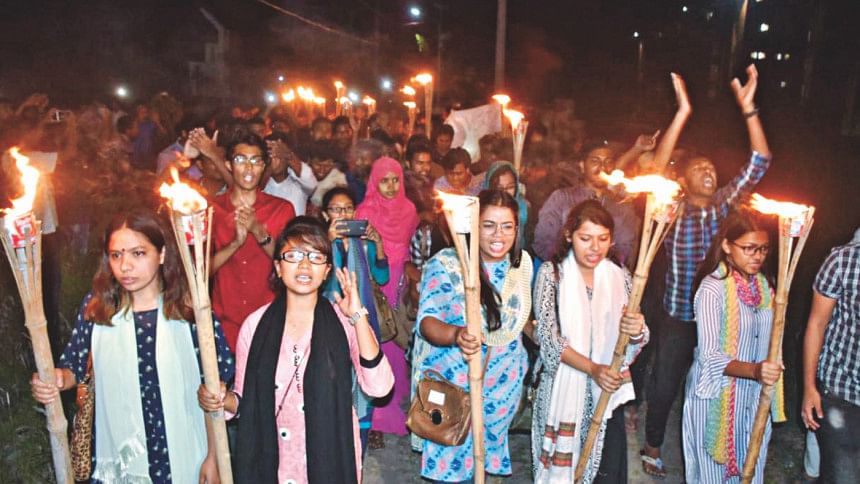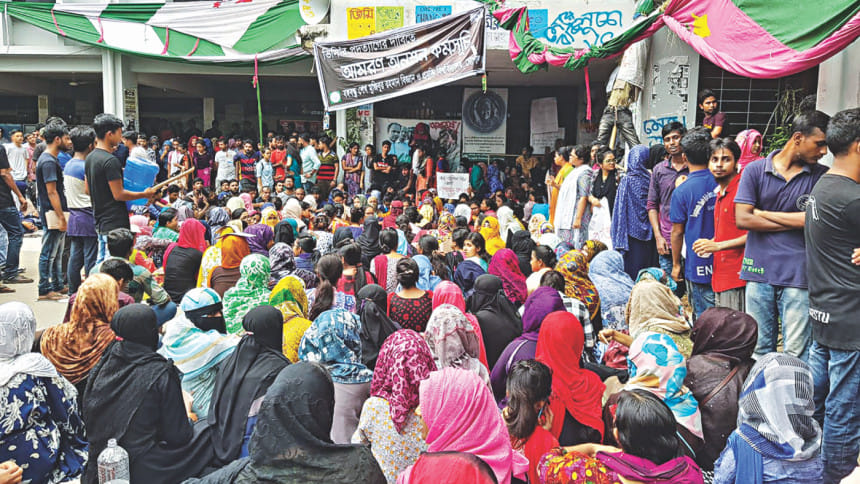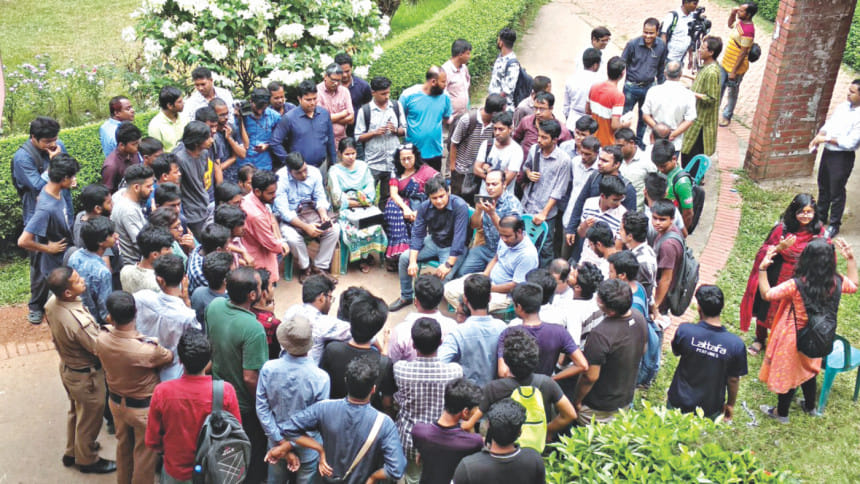A Vices’ circle

I don't know whether to call it luck that we get to witness the development of a brand-new English phrase right under our noses. The expression is "Vices' circle". Yes, it sounds like "vicious circle", but is slightly different and has a quite particular meaning. It means, "A circle of Vice Chancellors (of Bangladeshi universities) who are accused of countless 'vices' while performing their duties." Of course, the phrase exists only in my mind, not in dictionaries. At least, not yet.
Over the last two weeks, Bangladeshis have been bombarded with a series of stories of 'vices' conducted by the VCs of some of our public universities. Now, let's be honest—there have been countless mishaps in public universities for decades, spanning from the killing of students or teachers to extortion and other petty crimes, often committed by students loyal to ruling parties. Politicisation of these institutions have also stoked debates in the recent past and university authorities have been censured for being too inclined to serve the 'rulers'.
But setting aside political or ideological biases, Vice Chancellors, the topmost executives in institutions of higher education, have—until a few years ago—not been called 'criminal offenders'. However, recent shocking developments are challenging this very notion—top bosses at higher educational institutes are now being accused of criminal offences.
The ongoing saga centering Farzana Islam, the incumbent Vice Chancellor of Jahangirnagar University, is essentially a story of embezzlement of public money and abuse of power. As per media reports, she gave Tk 1.60 crore as 'Eid Salami' to Bangladesh Chhatra League (BCL) leaders on campus (who have also confessed that they received that amount from her). Why has she been appeasing the ruling party student wing with such a large sum? And where did she get this money? A mega "development" project worth Tk 1,445 crore is being undertaken in the JU campus and there are all indications that Farzana tried to strike a deal with BCL in an attempt to eliminate any barriers to the particular way in which she, along with her family members, wanted to "handle" the project.
Farzana was trying desperately to dispel the negative talk surrounding her by denying allegations and accusing central Chhatra League leaders of spreading "manufactured stories" against her. In the meantime, JU Chhatra League leader Saddam Hossain got threatening calls from unknown sources in wake of his disclosure of the VC's involvement in the Tk 1.60 crore settlement.

The mobile phone connections of three top JU Chhatra League leaders including Saddam Hossain were cut off after a phone conversation among them was leaked on social media. The leaders were heard talking about the deal and the VC's role in it. Six teachers of the university, who were participating in anti-corruption protests, also claimed their mobile phone connections were disrupted. We know very well that only people of 'authority' have the ability, no matter legal or illegal, to ask mobile phone companies to cut off someone's connection.
Jahangirnagar University is not the only institution in the country that is currently experiencing a bad episode due to its VC. Two days back, a simple Google search to see what newspaper reports on public universities'—the words 'VC' in the Bangla alphabet and its translation 'upacharya'—led to hundreds of perturbing stories, including that of serious corruption allegations against the VCs of at least eight top universities.
I can't help but mention one—Professor Khondoker Nasiruddin, Vice Chancellor of Bangabandhu Sheikh Mujibur Rahman Science and Technology University (BSMRSTU). Several thousand students have been demonstrating for weeks for Nasiruddin's removal, bringing allegations against him of sexual harassment, nepotism in recruiting teachers and other employees, and corruption in development projects, including the construction of the Shaheed Minar and Bangabandhu's mural on the campus.
He remains at his post and even expelled (later retracting his decision) a female student named Fatema Tuz Zinia, also the university correspondent of a national daily, for her attempt to investigate his corruptions. In a leaked audio conversation, Nasiruddin was heard using disparaging and threatening language with his students.

Allegations of corruptions and abuse of power against Barisal University's VC triggered a student movement that has been waged for months. Such vices were also reported against the Vice Chancellors of Begum Rokeya University, Chittagong University, Rajshahi University, Cumilla University, and others.
Why is such corruption and misconduct rampant amongst our VCs? What fuels the highest-ranking officials—and teachers too—of these establishments to conduct themselves so inappropriately? Where does the problem really lie?
To many, partisan political considerations and priorities during appointment in public universities is to blame for the bleak scenario across the country. VCs (and other top officials) care more about the interest of ruling party cadres than that of students, and by extension, the nation.
Years back, the National Strategic Plan for Higher Education of Bangladesh recommended a number of policy reforms and interventions to be implemented to enhance the quality of higher education. The first two recommendations were: (i) depoliticisation of public universities; (ii) setting up a national search committee for selecting Vice Chancellors and other senior officials.
If it can be ensured that the main quality of being appointed as a Vice Chancellor (and other officials) is not one's partisan political identity, vicious practices in universities is bound to decline.
The national strategic plan for higher education shows that we actually know where the problem lies and its remedies as well, but we do not care enough to take these seriously. Due to this indifference, the standard of higher education is decreasing at an alarming rate, brain drain is as acute as ever, and there is a plethora of underqualified graduates struggling to make do in the job market. Bangladeshi public universities are failing to appear in global ranking charts. To avoid further damage, our higher educational institutes should be out of this vicious circle of narrow partisan politics.
Qadaruddin Shishir is a journalist. He is a co-founder and editor of BD FactCheck.

 For all latest news, follow The Daily Star's Google News channel.
For all latest news, follow The Daily Star's Google News channel. 



Comments